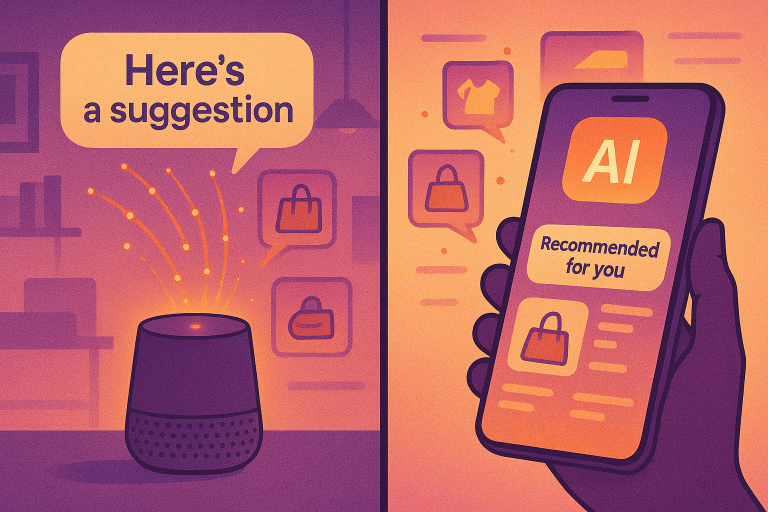How AI Shopping Companions Are Revolutionizing Retail Experiences
In the rapidly evolving digital marketplace, finding exactly what you need can sometimes feel like searching for a needle in a haystack. Enter AI shopping companions – sophisticated digital assistants that are transforming how we discover, evaluate, and purchase products. These intelligent advisors go beyond basic recommendations to understand your preferences, anticipate your needs, and guide you through increasingly complex shopping environments.
As we navigate an era of overwhelming choice and information abundance, AI shopping companions serve as your personal concierge, cutting through the noise to deliver truly relevant recommendations while saving you precious time and effort. Let’s explore how these intelligent systems are revolutionizing retail experiences and what this means for consumers and businesses alike.

What Are AI Shopping Companions?
AI shopping companions are sophisticated digital assistants that leverage artificial intelligence to provide personalized shopping guidance and recommendations. Unlike basic recommendation systems that simply suggest “products like this” or “frequently bought together” items, true AI companions understand context, learn from interactions, and adapt to individual preferences over time.
These intelligent assistants serve as digital shopping confidants, helping consumers navigate the complex world of product options while offering insights tailored to their unique needs, preferences, and shopping habits.
Evolution from Basic Recommenders to Intelligent Assistants
The journey from simple recommendation engines to today’s sophisticated AI companions has been remarkable:
- First Generation (1990s-2000s): Basic collaborative filtering systems that recommended products based on what similar customers purchased
- Second Generation (2000s-2010s): More sophisticated algorithms incorporating browsing history, demographics, and explicit preferences
- Third Generation (2010s-Present): AI-powered conversational shopping assistants that understand natural language, learn continuously, and anticipate needs before they’re expressed
The most significant shift has been from reactive to proactive assistance. Early systems simply responded to direct queries or actions, while today’s AI companions can anticipate needs, make preemptive suggestions, and engage in meaningful dialogue about products and preferences.
Key Technologies Powering Modern AI Shopping Companions
| Technology | Function | Shopping Application |
|---|---|---|
| Natural Language Processing (NLP) | Understanding conversational inputs and context | Enabling human-like text and voice interactions about product queries |
| Computer Vision | Analyzing and understanding visual content | Visual search, virtual try-ons, and product recognition from images |
| Predictive Analytics | Forecasting future preferences and behaviors | Anticipating needs based on past purchase patterns and life events |
| Behavioral Modeling | Creating detailed profiles of individual shopping habits | Understanding personal preferences, price sensitivity, and decision factors |
These foundational technologies work in concert to create shopping companions that understand not just what you’re looking for, but why you’re looking for it, and what factors matter most in your decision-making process.
How AI Shopping Companions Transform the Shopping Experience
The integration of AI companions into the shopping journey has fundamentally changed how consumers interact with retailers and products. These intelligent assistants create more intuitive, efficient, and enjoyable experiences across all shopping channels.
Personalization Beyond Surface-Level Recommendations
Modern AI companions deliver a depth of personalization that was previously impossible:
- Deep preference understanding: Learning the subtle differences between “like” and “love” for specific features, styles, or brands
- Context-aware suggestions: Considering time, location, weather, upcoming events, and even mood when making recommendations
- Adaptive learning: Continuously refining suggestions based on feedback, both explicit (ratings) and implicit (browsing behavior)
- Anticipatory recommendations: Suggesting products before you even realize you need them based on usage patterns and lifestyle
This sophisticated approach moves beyond simply matching you with products similar to past purchases, instead understanding the underlying reasons for preferences and applying that knowledge to new contexts.
Streamlining Decision-Making Processes
In an age of overwhelming choice, AI companions serve as cognitive filters:
- Reducing choice overload by narrowing options to truly relevant contenders
- Filtering based on personal values like sustainability, ethical production, or specific ingredient preferences
- Creating side-by-side comparisons that highlight the features that matter most to you specifically
- Explaining recommendations in terms that resonate with your individual priorities
By handling the cognitive burden of comparing dozens of options across multiple factors, AI companions free you to focus on the final decision between well-matched alternatives.
Creating Seamless Omnichannel Experiences
Modern shopping rarely happens exclusively in one channel. AI companions excel at creating continuous experiences:
- Maintaining consistent knowledge of preferences across web, mobile, in-store, and voice interactions
- Providing in-store navigation assistance to locate previously viewed online items
- Enabling seamless transitions between research on one device and purchase on another
- Creating hybrid experiences where online research enhances offline shopping and vice versa
This omnichannel consistency respects the reality that shopping journeys are rarely linear and often span multiple sessions and touchpoints before culminating in a purchase.
Popular AI Shopping Companion Solutions
The marketplace for AI shopping companions has expanded rapidly, with solutions ranging from retail giants’ proprietary systems to specialized independent platforms.
Retail Giants’ AI Assistants
Major retailers have made significant investments in AI capabilities:
- Amazon: Its recommendation engine drives 35% of purchases, while Alexa provides voice-based shopping assistance
- Alibaba: FashionAI combines in-store smart mirrors with online style recommendations
- Walmart: Intelligent Retail Lab tests AI applications from inventory management to personalized shopping
- Target: Uses AI to create personalized deals and recommendations through its Circle program
These systems benefit from massive datasets and integrated ecosystems that track preferences across vast product catalogs.
Independent AI Shopping Platforms
Specialized platforms focus on specific shopping categories or experiences:
- Fashion: Stitch Fix combines human stylists with AI to deliver personalized clothing selections
- Grocery: Instacart’s AI suggests replacements and complements previously purchased items
- Electronics: Best Buy’s app uses AI to navigate technical specifications and compatibility
- Luxury: Farfetch uses AI to provide high-end personal shopping experiences digitally
These specialized companions often provide deeper expertise in specific domains compared to general-purpose assistants.

Mobile and Voice-Based Shopping Companions
The integration of shopping capabilities into existing voice assistants has accelerated:
- Google Assistant: Enables shopping across participating retailers through voice commands
- Apple Siri: Integrates with Apple Pay and partner retailers for voice-initiated purchases
- Specialized Apps: Dedicated shopping apps like ShopStyle and The Yes use AI for highly personalized experiences
Voice-based shopping is projected to reach $80 billion by 2023, making it one of the fastest-growing segments of AI-powered shopping companions.
Benefits of Using AI Shopping Companions
The advantages of shopping with AI assistance extend beyond convenience to fundamental improvements in the shopping experience.
Time and Effort Savings
In our busy world, the efficiency benefits of AI companions are significant:
- Reducing search time by up to 75% through predictive suggestions and filters
- Automating repetitive purchasing through subscription management and reordering
- Streamlining comparison shopping by highlighting meaningful differences
- Enabling quick reordering of frequently purchased items with minimal input
For routine purchases, AI companions can transform minutes of browsing into seconds of confirmation, freeing up valuable time and mental energy.
Enhanced Discovery and Exposure to New Products
Sophisticated AI companions balance familiarity with discovery:
- Breaking you out of filter bubbles by intelligently introducing new brands and products
- Enabling serendipitous discovery through carefully calculated “surprise” recommendations
- Exposing you to relevant alternatives that might better meet your needs than established favorites
- Balancing recommendations between proven preferences and reasonable experiments
This careful curation prevents shopping habits from becoming too rigid and introduces novelty without overwhelming.
Budget Optimization and Deal Finding
AI companions can serve as powerful financial allies:
- Tracking price histories to identify the best time to purchase
- Alerting you to sales on wishlist items or frequently purchased products
- Suggesting alternative products that offer better value
- Optimizing price-to-performance ratios based on your usage patterns
By analyzing historical pricing data and understanding your value priorities, AI companions help ensure you get the best possible value on every purchase.
Privacy and Ethical Considerations
The personalization capabilities of AI shopping companions rely on extensive data collection, raising important privacy and ethical questions.
Data Collection Practices and Transparency
Consumers should understand:
- What data is being collected (browsing history, purchase records, location, voice recordings)
- How that data is being used (personalization, product development, marketing)
- What control options exist for limiting data collection or requesting deletion
- How recommendations are generated and what factors influence suggestions
Responsible AI shopping companions provide clear privacy policies and granular control over data collection and usage.
Balancing Personalization with Privacy
Emerging approaches offer ways to maintain personalization while enhancing privacy:
- On-device processing: Keeping sensitive data on your personal device rather than in the cloud
- Federated learning: Training AI models across many devices without centralizing personal data
- Differential privacy: Adding “noise” to datasets to protect individual identities while maintaining aggregate insights
- Anonymous personalization: Using cohort-based approaches rather than individual profiles
These technologies represent promising directions for addressing the tension between highly personalized experiences and personal privacy.
The Future of AI Shopping Companions
The evolution of AI shopping companions continues to accelerate, with several emerging trends pointing to their future development.
Integration with Emerging Technologies
The next generation of AI companions will leverage:
- Augmented reality: Virtual try-ons and product visualization in your own space
- Virtual reality: Immersive shopping environments with AI guides
- IoT integration: Smart appliances that communicate with shopping assistants about needs and usage
- Wearables: Shopping assistants that travel with you via smartwatches or AR glasses
These integrations will further blur the line between digital and physical shopping experiences, creating new hybrid models guided by AI companions.
Predictive and Anticipatory Shopping
Future AI companions will become increasingly proactive:
- Automating routine purchases based on predicted need
- Anticipating life events (moving, new baby, new job) and suggesting relevant products
- Adjusting recommendations based on seasonal changes, weather forecasts, or upcoming events
- Learning household patterns to predict needs before they’re explicitly expressed
This shift toward anticipatory commerce will transform shopping from a deliberate activity to an ambient service that addresses needs as they emerge.
Emotional Intelligence and Relationship Building
The most sophisticated future companions will incorporate:
- Sentiment analysis to understand emotional responses to products
- Adaptive personality features that match your communication style
- Trust-building mechanisms that explain recommendations transparently
- Relationship memory that recalls past conversations about preferences and priorities
These emotional intelligence capabilities will transform AI shopping companions from tools to trusted advisors with whom consumers build lasting relationships.
Conclusion
AI shopping companions represent a fundamental shift in how we discover, evaluate, and purchase products. By combining sophisticated AI technologies with deep understanding of individual preferences, these digital assistants streamline decision-making, save time, and enhance product discovery while navigating increasingly complex retail environments.
As these systems continue to evolve, they promise to transform shopping from a sometimes frustrating search process to an intuitive, efficient experience where products find you at the moment of need. For businesses, AI companions offer unprecedented opportunities to build deeper customer relationships through genuinely helpful, personalized assistance.
Whether you’re looking to simplify routine purchases or discover products perfectly matched to your unique preferences, AI shopping companions are rapidly becoming indispensable allies in the complex world of modern retail.
